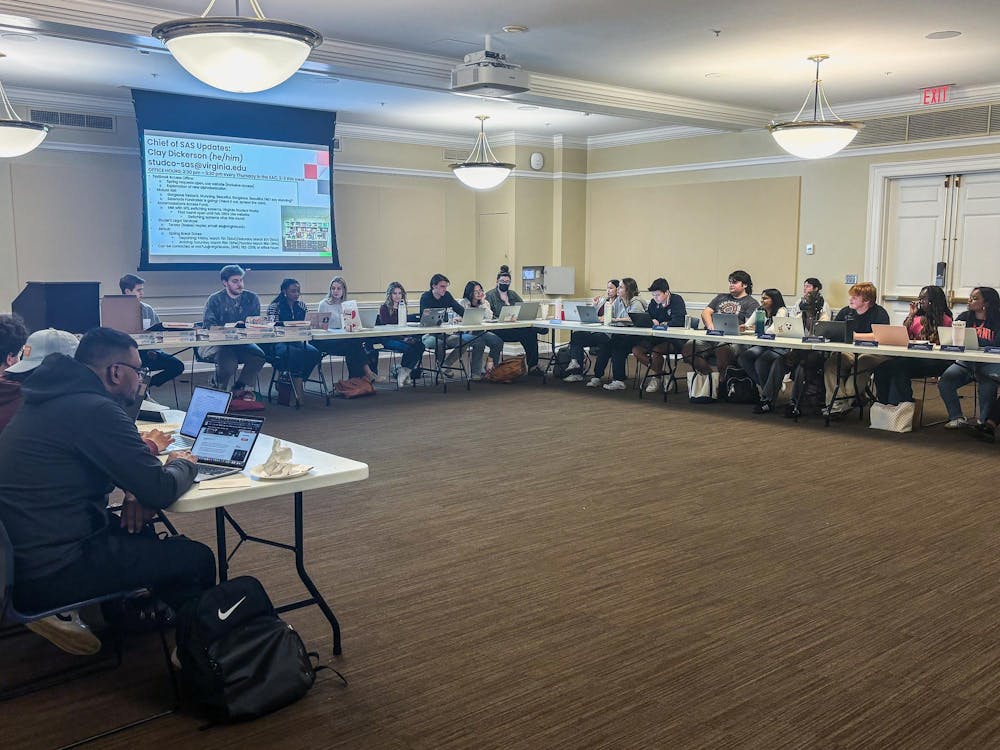Student Council passed a resolution to implement more dining options at the School of Law during Tuesday’s meeting, following complaints from law students over the lack of whole food options and limited dining hours. Additionally, second-year College Reps. Ian Travis and Brian Ng, discussed information regarding the E-Jest — a small, electric bus coming to Grounds — following the official launch of E-Jest services Feb. 21.
Law Rep. Kasey Michaud sponsored the resolution calling for increased food availability at the Law school located on North Grounds. The current dining option is the Sidley Austin Café, which is only open on weekdays, and closes at 1:30 p.m. While Michaud said there are plenty of vending machines to provide students with packaged snacks beyond the cafe hours, there is a lack of whole, natural food after the cafe closes each day.
“[The Law school] is kind of a food desert,” Michaud said. “We have no choice but to be there because our classes run way beyond cafe hours.”
The bill passed unanimously, and while Michaud said he does not yet know what the most efficient dining installation will be, he does not believe a mini market is the way to go as this could lead to the only available option again being prepackaged food.
Tuesday’s meeting also included a presentation from Ng and Travis who toured the E-Jest Feb. 21 — the first day this bus began services — and provided the Council with information regarding student usage of this service. According to Travis, the all-electric, 17-person capacity E-Jest has a 100-mile practical range of driving on a single tank of battery charge and is fully ADA accessible.
Travis and Ng were able to take a ride in the bus and said it can travel down even the narrowest streets of the Corner. Like all other UTS buses, the e-Jest will be open to both University students and community members.
Travis said he predicts the E-Jest will be utilized most often for the Night Pilot bus route on weekday nights where this route typically is not crowded. The Night Pilot is a UTS route that runs 10 p.m. to 2 a.m. every day of the week, stopping at academic buildings and one location on University Ave., and looping through first-year and upperclassmen dorms.
Beyond the E-Jest and Night Pilot program, a passenger survey sent to students as well as general feedback Travis has received revealed that some students feel unsafe taking UTS buses at night. Travis noted UTS is considering adding a security officer to each bus during Night Pilot hours as a result of this feedback.
Another safety concern surrounded the idea of non-University students boarding UTS buses. Travis said this cannot be changed because students would then need to pay to use the Charlottesville Area Transit buses, which is, according to Travis, a tradeoff the University is not willing to make. CAT is a fare-free service to transport people around the entire city of Charlottesville and is separate from UTS but still available to University students.
The second resolution passed at Tuesday’s meeting approved six new Contracted Independent Organizations, which include everything from a flag football club team, to several professional clubs and volunteering organizations.
Second-year College Rep. Jackson Sleadd stated his support for the efforts made by these student organizations to achieve CIO status, noting that while the Organizations Branch of Student Council works hard to approve CIOs, the process to receive approval is often long and difficult.
“It sounds like on the student engagement end, [the Org. process] has been really long and some might say inefficient,” Sleadd said. “I really appreciate everything [the] Org. branch is doing but want to shout out the work you all did to bring your organizations to your fellow students. What you all are doing is student self-governance.”
Brookelyn Mitchell, vice president for administration and fourth-year College student, also announced that the Student Council utilization rate — a rate which shows the percentage of allocated funding used by each Student Council agency — is up to 61 percent this year. Mitchell stated that this is a huge increase compared to historical utilization rates. Increasing utilization rates has been a big goal of Mitchell’s throughout her term in order to avoid overbudgeting and underspending internally.
Student Council will not meet for a regularly scheduled general body meeting next week due to Spring recess, but will reconvene March 18.







